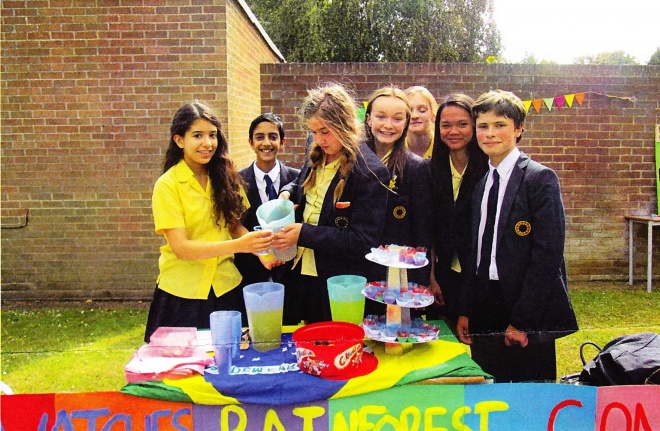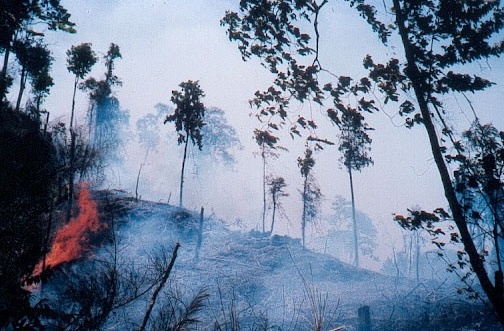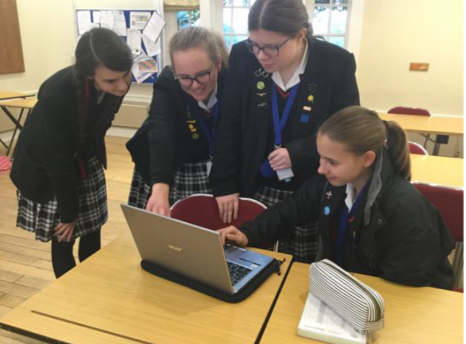From time to time we feature articles on our website that students have written. Below is an article from students at Pipers Corner School who has supported Rainforest Concern.
From our school supporters

Tropical Rainforests and Sustainability - Our Future
Between 2015 and 2020, the global rate of deforestation has been estimated to be 10 million hectares per year, most notably occurring across South East Asia and Amazonia, the latter of which is home to approximately 1 in 10 global species, including 40,000 plant varieties. (Source: Food and Agriculture Organisation of the United Nations) This article will explore the broad and complex consequences of deforestation and the importance of sustainability in reducing the menacing threats these vast areas of wilderness face. We will also consider what we strive to do as a school and in the wider community to increase sustainability and awareness of these issues.
HOPE (Helping Others to Protect the Environment) is an environmental group at Pipers Corner School, in Buckinghamshire. Our aim is, through research and careful consideration of the most dominant issues threatening our environment, to boost sustainability in school and the wider community and to raise awareness of its importance for future generations. Living almost 6,000 miles from Amazonia, it is arguably difficult to comprehend these issues and the effects they have on people’s lives. A staggering 80% of organic foods originate in tropical rainforests (Oddizzi), yet it is clear that general public awareness of this is shockingly low.
To demonstrate this, we showed a group of 13 students 14 images of everyday commodities. Each student had to guess which of the 14 items had a connection to the rainforest. Unsurprisingly, the results were largely accurate when asked about the origins of wooden garden furniture, vanilla pods and food colouring. Interestingly, just 52% could correctly identify that most medicinal drugs have a connection to the rainforest, whilst just over 50% could tell us that shampoo contains rainforest products. But most interesting was this: only 30% could identify a t-shirt as having rainforest origins. These are everyday items, the origins of which young people of today will grow up completely unaware of. (Image: Pipers Corner School HOPE Year 10 Group). This survey - whilst conducted on a very small scale - highlights once more the urgent need for education of young people who will ultimately be at the forefront of these environmental challenges.

Approximately 137 species are becoming extinct everyday in rainforests due to deforestation. That equates to 50,000 per year (Rainforest Action Network). Additionally, deforestation accounts for roughly 4.8 billion tonnes of carbon emissions (Climate Council) whilst 39 million acres were cleared in 2017, (Mongabay) contributing to increased flooding and soil erosion. (Pachamama Alliance). That is an area the size of Bangladesh, but this is not all. There have been 14 severe floods recorded in Amazonia since 1903, reaching up to 30m and lasting for up to 70 days. (Mongabay) Nutrient-rich floodplains offer the perfect conditions for agricultural growth but prolonged, severe flooding can cause extensive crop and pasture damage, as well as water contamination for local residents and indigenous people. Rainforest Concern have fought to turn this around, working in South America, East Asia and Eastern Europe.
Having helped to protect 2.2 million hectares of threatened woodland in 28 years, (Rainforest Concern) their work will be instrumental in reducing biodiversity loss and habitat destruction of the thousands of species critically affected by deforestation, and protecting indigenous people who call the rainforests “home.”
Our Green Week raised just over an astonishing £980 which through Rainforest Concern protects and conserves 18 acres of precious rainforest helping to create a sustainable future.
this will be everybody’s responsibility, to spread the awareness, to spread the message and to take action, as for some, the rainforest is not just a commodity, it is their home that will no longer stand if we do not take action.
But what about the UK?
With a target of bringing greenhouse gas emissions to net-zero by 2050, there’s a lot of work to do. Costing in the region of £50 million, the Northern Forest is a project that will transform the landscape of many UK cities, including Liverpool, Chester, Manchester, Leeds, Sheffield and Hull, with the aim of planting 50 million trees. (The Northern Forest) The area currently has a woodland cover of just 7.6%, which is far below the average for Europe. Whilst the long term success of the project is unknown, it is estimated that thousands of tonnes of carbon dioxide could be stored.
Additionally, this project could reduce the risk of flooding, create thousands of new jobs, and visually enhance the local area, making the 13 million residents happier and healthier. (The Northern Forest) It is projects like these which are the face of much-needed change for the future. It demonstrates the influence everybody in every country has on the rainforest and how, despite being 6,000 miles apart, we can do our bit to offset carbon emissions and increase awareness of the threats these species face. We would like to conclude the article with a thank you to Rainforest Concern for their vital work that will continue to help the rainforest for future generations.
We, as a club and a School recognise your achievements so far - but this is not just going to be a charity effort: this will be everybody’s responsibility, to spread the awareness, to spread the message and to take action, as for some, the rainforest is not just a commodity, it is their home that will no longer stand if we do not take action.
After all, in the words of Greta Thunberg: "I want you to act as if the house (the world) is on fire, because it is."

This article was written by Chloe James, Veronica Guillian, Elizabeth Lawrence and Nia Feakes from Year 10 at Pipers Corner School